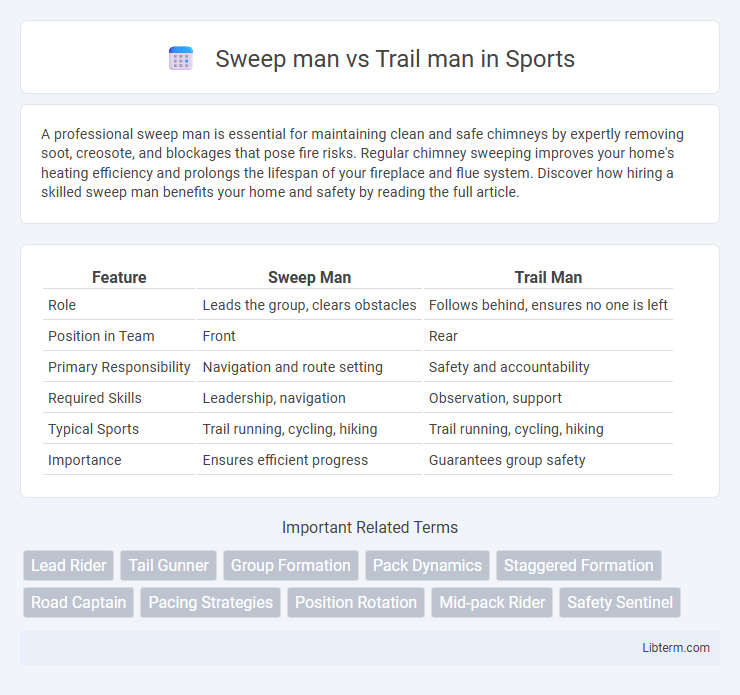A professional sweep man is essential for maintaining clean and safe chimneys by expertly removing soot, creosote, and blockages that pose fire risks. Regular chimney sweeping improves your home's heating efficiency and prolongs the lifespan of your fireplace and flue system. Discover how hiring a skilled sweep man benefits your home and safety by reading the full article.
Table of Comparison
| Feature | Sweep Man | Trail Man |
|---|---|---|
| Role | Leads the group, clears obstacles | Follows behind, ensures no one is left |
| Position in Team | Front | Rear |
| Primary Responsibility | Navigation and route setting | Safety and accountability |
| Required Skills | Leadership, navigation | Observation, support |
| Typical Sports | Trail running, cycling, hiking | Trail running, cycling, hiking |
| Importance | Ensures efficient progress | Guarantees group safety |
Understanding the Roles: Sweep Man vs Trail Man
The Sweep Man plays a critical role in search and rescue operations by systematically clearing areas behind the main search line to ensure no clues or victims are missed, often covering difficult terrain to maintain thoroughness. The Trail Man works ahead of the main group, marking the path and tracking signs of movement to guide the team and prevent confusion during the search. Understanding the distinct responsibilities of Sweep Man versus Trail Man enhances coordination and efficiency in wilderness rescue missions, optimizing coverage and minimizing search time.
Key Responsibilities of a Sweep Man
A Sweep Man ensures the safety and efficiency of a worksite by following closely behind the team to monitor completed tasks and clear any debris or obstacles. Key responsibilities include identifying hazards, securing the area, and providing immediate support during emergencies or equipment malfunctions. Sweep Men must maintain constant communication with trail team members to uphold safety standards and prevent accidents.
Core Duties of a Trail Man
A Trail Man is primarily responsible for inspecting and maintaining railroad tracks to ensure safety and operational efficiency. Core duties include detecting and repairing track defects, replacing damaged rails, and clearing debris to prevent derailments. Their role is crucial in conducting routine track inspections and coordinating with maintenance crews to uphold railroad infrastructure integrity.
Skill Sets Required: Sweep Man and Trail Man Compared
Sweep men require strong physical endurance and proficiency in operating brush-clearing tools to effectively remove vegetation and debris, ensuring a clear and safe fireline. Trail men must possess advanced navigation skills, map reading expertise, and the ability to maintain communication within the team while creating and maintaining the fire trail. Both roles demand situational awareness and teamwork, but Sweep men focus on manual clearing while Trail men emphasize route planning and coordination.
Safety Protocols: Sweep Man vs Trail Man
Sweep Man ensures crew safety by monitoring the rear perimeter and quickly addressing hazards during operations, minimizing risks of accidents or equipment damage. Trail Man maintains safety by securing tools, materials, and personnel at the back of the work zone, preventing falls and ensuring clear retreat routes. Together, their coordinated roles enhance overall site safety through vigilant observation and physical support in dynamic field conditions.
Challenges Faced on the Trail
Sweep men often encounter challenges such as navigating difficult terrain while ensuring no participant is left behind, requiring constant vigilance and physical endurance. Trail men face obstacles including marking paths clearly in varied environmental conditions and managing unexpected trail hazards like fallen trees or wildlife encounters. Both roles demand strong problem-solving skills and adaptability to maintain safety and smooth progression during outdoor events.
Equipment and Tools: What They Use
Sweep men typically use industrial brooms, floor scrubbers, and dust control equipment designed for large surface areas in factories or warehouses, ensuring efficient debris removal and dust minimization. Trail men often rely on chainsaws, brush cutters, and hand tools for clearing trails and managing underbrush in rugged terrain. Both roles prioritize durable, ergonomic tools suited to their specific environments for optimal performance and safety.
Team Dynamics: How Sweep and Trail Men Collaborate
Sweep men and trail men work in tandem to ensure efficient team dynamics in climbing or firefighting scenarios, where the sweep man leads by clearing obstacles and setting pace while the trail man manages equipment and monitors team safety from behind. Their collaboration hinges on constant communication and synchronized movements to navigate challenging terrains effectively. This dynamic partnership enhances overall team cohesion, reduces risks, and improves operational success during missions.
Importance in Event Success
Sweep men play a critical role in event success by ensuring all participants safely complete the course and providing immediate assistance when needed, thus maintaining overall event integrity. Trail men enhance participant experience and event flow by monitoring course conditions and guiding late or struggling participants, preventing confusion and ensuring smooth progression. Both roles contribute significantly to safety, organization, and participant satisfaction, which are essential for successful event execution.
Choosing the Right Role: Sweep Man or Trail Man
Choosing the right role between Sweep Man and Trail Man depends on the specific requirements of a firefighting team and terrain conditions. Sweep Men focus on ensuring no residual flames or hotspots remain after the main fire front passes, requiring vigilance and thoroughness in mop-up operations. Trail Men, conversely, monitor the rear edge of the fire line to prevent flare-ups and ensure containment, making their role critical in maintaining perimeter control during wildfire suppression.
Sweep man Infographic

 libterm.com
libterm.com